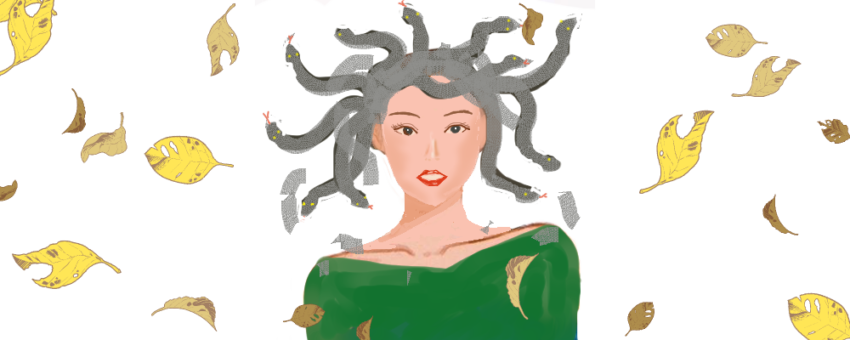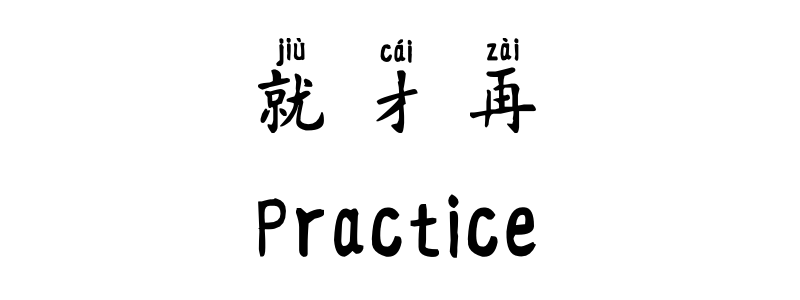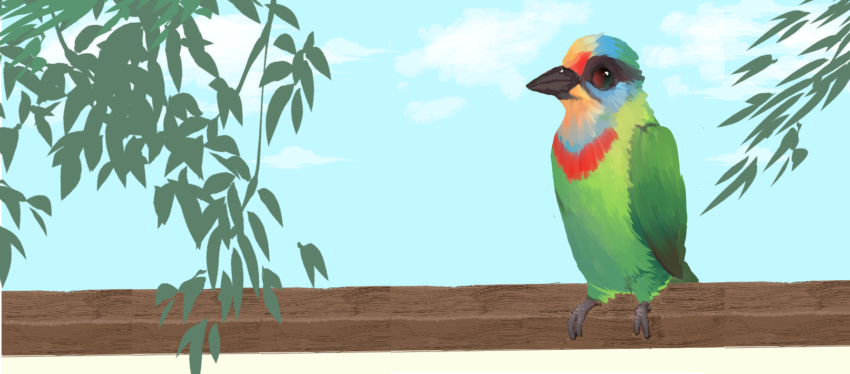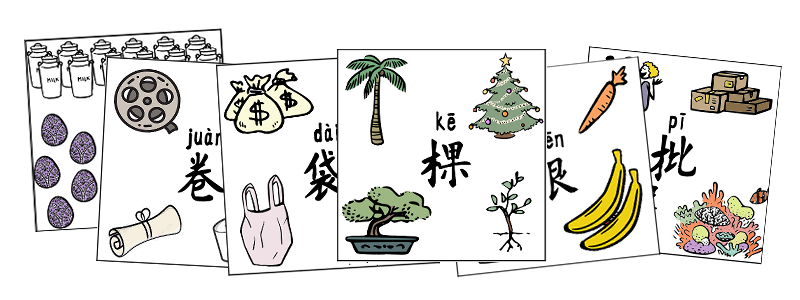“Medusa’s annoyance” is a story for HSK7+ learners. Stories I shared some are Chinese folk tales, and some are my creations. Warning most of my stories are not for kids. Listen the Complete Story Story Story Part 1 Story Part 2 Story Part 3 Story Part 4 「你說這什麼話!你眼睛不舒服跟我可能被石化哪個更嚴重!總之你快點把隱形眼鏡戴上,去清廁所裡的頭髮啦!」說完雅典娜就生氣地離開了。 “你说这什么话!你眼睛不舒服跟我可能被石化哪个更严重!总之你快点把隐形眼镜戴上,去清厕所里的头发啦!” 说完雅典娜就生气地离开了。 這世界為什麼總是這樣呢?外貌好像決定了一切,雅典娜有著白皙的皮膚、金色柔軟的頭髮,所以被稱為女神,她所做的一切都是好的,都是被認同的;再看看被稱為女妖的自己,明明不斷地委屈自己,明明不斷地忍耐著,卻還是被人討厭,被世界厭惡。回想當初波賽頓(Poseidon)的事件,自己明明是個受害者,卻成為被處罰的人,真正的加害者卻可以繼續在世界上耀眼的生活。 这世界为什么总是这样呢?外貌好像决定了一切,雅典娜有着白皙的皮肤、金色柔软的头发,所以被称为女神,她所做的一切都是好的,都是被认同的;再看看被称为女妖的自己,明明不断地委屈自己,明明不断地忍耐着,却还是被人讨厌,被世界厌恶。回想当初波赛顿(Poseidon)的事件,自己明明是个受害者,却成为被处罚的人,真正的加害者却可以继续在世界上耀眼的生活。 Pinyin `Nǐ shuō zhè shénme huà! Nǐ yǎnjīng bù…
Author: tiffany
Story – Medusa’s annoyance 2
“Medusa’s annoyance” is a story for HSK7+ learners. Stories I shared some are Chinese folk tales, and some are my creations. Warning most of my stories are not for kids. Listen the Complete Story Story Story Part 1 Story Part 2 Story Part 3 Story Part 4 「美杜莎!!」房門外傳來室友雅典娜(Athena)的聲音。「浴室裡有蛇!!我說過了你洗完頭一定要打掃乾淨!」 “妳不要进来!” 美杜莎吓了一跳,赶快用手盖住自己的眼睛喊道 “我已经把隐形眼镜拿掉了,所以不要进来!” 「妳不要進來!」美杜莎嚇了一跳,趕快用手蓋住自己的眼睛喊道。「我已經把隱形眼鏡拿掉了,所以不要進來!」 门外的雅典娜收回了门把上的手,生气地说 :“你为什么现在就摘隐形眼镜,你难道不知道你的眼睛很危险吗?如果别人看到后被你石化怎么办啊!” 門外的雅典娜收回了門把上的手,生氣地說:“你為什麼現在就摘隱形眼鏡,你難道不知道你的眼睛很危險嗎?如果別人看到後被你石化怎麼辦啊!」 门外的雅典娜收回了门把上的手,生气地说:“你为什么现在就摘隐形眼镜,你难道不知道你的眼睛很危险吗?如果别人看到后被你石化怎么办啊!” 啊!煩死了!「我戴了一天的眼鏡,眼睛真的很乾很不舒服,而且我是在我的房間又沒有出去!」 啊!烦死了!“我戴了一天的眼镜,眼睛真的很干很不舒服,而且我是在我的房间又没有出去!” Pinyin Měidùshā wúnài de pāile…
就, 才, 再 Practice
TouchHover over the space to see the answers. Fill in the correct word – 就/才/再 她tā昨天zuótiān晚上wǎnshàng加班jiābān到dào夜裡yèlǐ一點yìdiǎn, 所以suǒyǐ晚上wǎnshàng兩點liǎngdiǎn( 才cái) 回huí到dào家jiā她tā昨天zuótiān晚上wǎnshàng加班jiābān到dào夜里yèlǐ一点yìdiǎn, 所以suǒyǐ晚上wǎnshàng两点liǎngdiǎn( 才cái) 回huí到dào家jiāShe worked late last night until 1:00 a.m., so she came home at 2:00 a.m. 因為yīnwèi加班jiābān很hěn累lèi, 她tā打算dǎsuàn今天jīntiān六點liùdiǎn吃chī完wán晚餐wǎncān( 就jiù) 睡覺shuìjiào因为yīnwèi加班jiābān很hěn累lèi, 她tā打算dǎsuàn今天jīntiān六点liùdiǎn吃chī完wán晚餐wǎncān( 就jiù) 睡觉shuìjiàoBecause she was tired from working overtime, she planned to have dinner at…
Story – The bird that likes to travel 4
“The bird that likes to travel” is a story for HSK4 learners. Stories I shared some are Chinese folk tales, and some are my creations. Warning: Most of my stories are not for kids. Listen the Complete Story Story Story Part 1 Story Part 2 Story Part 3 Story Part 4 五色鳥聽到有水果跟餅乾馬上就不生氣了。牠變回有禮貌的五色鳥大聲地跟我道謝說:「你有什麼我就吃什麼,謝謝你!」 五色鸟听到有水果跟饼干马上就不生气了。 它变回有礼貌的五色鸟大声地跟我道谢说:「你有什么我就吃什么,谢谢你!」 我在廚房想了一會兒,最後決定拿蘋果和我愛吃的小餅乾。回到房間後我把食物放在窗前,看著五色鳥高興地吃著。 我在厨房想了一会儿,最后决定拿苹果和我爱吃的小饼干。回到房间后我把食物放在窗前,看着五色鸟高兴地吃着。 五色鳥吃得很快,十分鐘就全部吃完了。 五色鸟吃得很快,十分钟就全部吃完了。 這時候五色鳥跳到了我的頭上說:「我吃飽了!現在有力氣了!為了謝謝你我決定帶你去旅行。」說完,五色鳥就把我的頭拔起來,帶著我的頭飛走了。 这时候五色鸟跳到了我的头上说:「我吃饱了!现在有力气了! 为了谢谢你我决定带你去旅行。」说完,五色鸟就把我的头拔起来,带着我的头飞走了。 Pinyin Wǔsè niǎo tīngdào…
Story – The bird that likes to travel 3
“The bird that likes to travel” is a story for HSK4 learners. Stories I shared some are Chinese folk tales, and some are my creations. Warning: Most of my stories are not for kids. Listen the Complete Story Story Story Part 1 Story Part 2 Story Part 3 Story Part 4 看她離開我身上,我也從床上坐了起來:「當然是因為我要工作!」 看她离开我身上,我也从床上坐了起来:「当然是因为我要工作!」 「那你把工作辭掉吧!」 「那你把工作辞掉吧!」 我馬上拒絕地說:「不行!這樣我會很擔心、很害怕。大家都說人應該有一份穩定的工作!」 我马上拒绝地说:「不行! 这样我会很担心、很害怕。 大家都说人应该有一份稳定的工作!」 「怎麼又是大家說!」五色鳥生氣了,因為生氣牠的毛變得蓬蓬的。 「怎麽又是大家说!」 五色鸟生气了,因为生气它的毛变得蓬蓬的。 看牠那麼生氣,我覺得有一點好笑。我站起來走向廚房說:「五色鳥,你別生氣了!我去幫你拿些水果跟餅乾,有什麼特別想吃的嗎?」 看它那么生气,我觉得有一点好笑。…
Story – The bird that likes to travel 2
“The bird that likes to travel” is a story for HSK4 learners. Stories I shared some are Chinese folk tales, and some are my creations. Warning: Most of my stories are not for kids. Listen the Complete Story Story Story Part 1 Story Part 2 Story Part 3 Story Part 4 「我不是這個意思,我的意思是我沒想到你會說話。」我不好意思地解釋。 「我不是这个意思,我的意思是我没想到你会说话。」 我不好意思地解释。 啾啾(鳥叫聲)五色鳥笑著說:「你為什麼驚訝?鸚鵡都會說人話了,我當然也能說。」 啾啾(鸟叫声)五色鸟笑着说:「你为什麽惊讶? 鹦鹉都会说人话了,我当然也能说。」 我想一想覺得很有道理,但是又好像不太對。 我想一想觉得很有道理,但是又好像不太对。 「大家都知道鸚鵡會說話,但是我沒聽過五色鳥會說話。」我說出了我的疑惑。…
Chinese Measure Words 4
Grammar Point: In this article, we are going to introduce the following Chinese measure words: 打 dǎ, 袋 dài, 根 gēn, 卷 juǎn, 棵 kē, 批 pī. 打 (dǎ) 打 dǎ is a measure word used for various objects that are usually hit or struck, such as balls, eggs, cans, etc. It is similar to the English measure word “a dozen”…
Indeed 2 díquè Grammar
Grammar Point: 的確的确 díquè is a commonly used phrase in Chinese that means “indeed” or “certainly”. It is often used to express agreement or confirmation of a fact or statement. Structure 的確确 díquè + Statement 的確的确 díquè is used to re-affirm the truth or accuracy of a statement previously presented, and to indicate that there…
Yoga Types
Yoga Types Sentences You May Hear 請qǐng找zhǎo一個yíge舒服shūfú的de坐姿zuòzī请qǐng找zhǎo一个yíge舒适shūshì的de坐姿zuòzīPlease find a comfortable seated position. 通過tōngguò鼻子bízi深呼吸shēnhūxī,,然後ránhòu從cóng嘴巴zuǐbā呼氣hūqì通过tōngguò鼻子bízi深呼吸shēnhūxī,,然后ránhòu从cóng嘴巴zuǐbā呼气hūqìInhale deeply through your nose and exhale through your mouth. 肩膀jiānbǎng放鬆fàngsōng,,視線shìxiàn柔和róuhé肩膀jiānbǎng放松fàngsōng,,视线shìxiàn柔和róuhéRelax your shoulders and soften your gaze. 緩慢huǎnmàn而ér有yǒu意識yìshi地de動作dòngzuò缓慢huǎnmàn而ér有yǒu意识yìshì地de动作dòngzuòMove slowly and mindfully. 如果rúguǒ你nǐ感到gǎndào任何rènhé不適búshì或huò疼痛téngtòng,,請qǐng告訴gàosù我wǒ如果rúguǒ你nǐ感到gǎndào任何rènhé不适búshì或huò疼痛téngtòng,,请qǐng告诉gàosu我wǒIf you feel any discomfort or pain, please let me know. Sentences You May Say 我wǒ頭tóu有點yǒudiǎn暈yūn, 休息xiūxí一下yíxià我wǒ头tóu有点yǒudiǎn晕yūn,,休息xiūxī一下yíxiàI feel a bit dizzy, let…
Earthquake Related Chinese
Sentences that you can use Expressing your concern Responding Vocabulary 今早jīnzǎo發生fāshēng了le一場yìchǎng規模guīmó6.3 的de地震dìzhèn今早jīnzǎo发生fāshēng了le一场yìchǎng规模guīmó6.3 的de地震dìzhèn An earthquake of 6.3 magnitude occurred this morning. 本次běncì地震dìzhèn的de震央zhènyāng位於wèiyú台灣táiwān東部dōngbù,,震度zhèndù達dá6 級jí本次běncì地震dìzhèn的de震央zhènyāng位于wèiyú台湾táiwān东部dōngbù,,震度zhèndù达dá6 级jí The epicenter of the earthquake was located in the eastern part of Taiwan, with a magnitude of 6. 本次běncì的de地震dìzhèn已yǐ造成zàochéng嚴重yánzhòng的de傷亡shāngwáng本次běncì的de地震dìzhèn已yǐ造成zàochéng严重yánzhòng的de伤亡shāngwáng The earthquake has caused serious injuries and deaths. 沿海yánhǎi地區dìqū請qǐng小心xiǎoxīn提防tífáng海嘯hǎixiào來臨láilín沿海yánhǎi地区dìqū请qǐng小心xiǎoxīn提防tífáng海啸hǎixiào来临láilín Beware of tsunamis in coastal areas. 因yīn受shòu地震dìzhèn影響yǐngxiǎng,…






